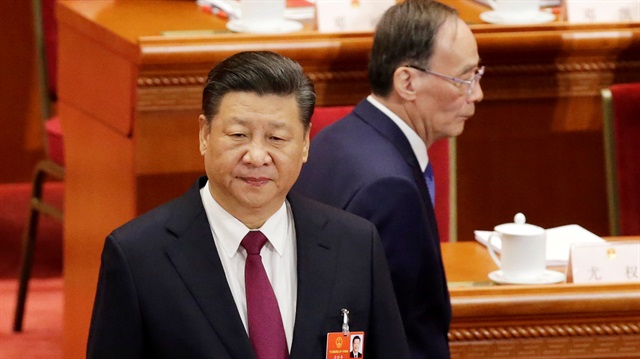
On Tuesday, Chinese President Xi announced that China would pledge $23 billion worth of loans, aid to Arab countries
Political analysts interpreted China's pledge to send more than $23 billion in loans and humanitarian aid to Arab countries as a step to increase Chinese influence in the region.
Dr. Altay Atli, a lecturer at Koc University, delivered remarks on Chinese President Xi Jinping's promise to send humanitarian aid and billions worth of loans to Arab countries during a conference, which was participated by 22 Arab countries, in Beijing.
Chinese interest was actually based on "Belt and Road Project" and China sped up its support to the Middle Eastern countries who were subjected to constant change due to wars and terror, Atli told Anadolu Agency.
"China produces half of its oil and gas on its own, however, the demand is too much. Therefore, China buys half of its oil and gas needs from the Middle East, hence the efforts to have a say in the region," he said.
Atli pointed out that China was solely focused on the economic aspects of the Middle East policy, however things changed after 2011's Arab Spring as China found itself isolated from the region in terms of economy.
"China continues its aids and investments to the region during the financial shifts. While doing this, it wants to join the roundtable by having a say in politics and economy of the Middle East, which will be reshaped again," he added.
Atli went on to note that China hadn't sent troops or fighter jets to the region despite being on the same page with Russia. "In short, China wants to maintain a presence within the scope of Belt and Road Project, it uses the economic presence instead of military intervention," he said.
- China's role in the Middle East
The conference was largely covered by the Chinese press as some experts opined that the loan and aid promise "might strengthen China's role in the region."
Chinese experts also pointed out that the move should be regarded as normal given that China had a Muslim population of 20 million.
Having established close ties with nine Arab countries via "Belt and Road Project", China would find more "practical" ways to the current problems in the region, according to Chinese experts.
- Security aspect of the Chinese investments
Experts stressed that safety should be the priority in the region, which suffers clashes and civil wars.
They warned that China's national interests might be imperiled should the oil sources or trade routes are to be cut all of a sudden.
Joost Hiltermann, the program director of the Middle East and North Africa for International Crisis Group, said that China assumed a financial role in the region, while staying away from the political issues.
"If their [China's] security status puts commercial interest and investments under danger, China, in the end, will have no other option than the military intervention. This will be a distressed period in which Beijing will take some tough decision. Along with some friends, they will also make some enemies," he asserted.
- China's great investment in Middle East
Chinese President Xi Jinping Tuesday announced in a conference participated by 22 Arab countries that Beijing would pledge more than $23 billion worth loans and humanitarian aid, $91 million of which would be sent to Syria, Yemen, Jordan, Palestine and Lebanon.
"China and Arab countries, in pursuit of modernization, must create synergy to bring out progress strategies," Xi said, noting a separate $151 million would be pledged for aid projects.
Xi also underlined that Beijing sought to increase cooperation in fields such as renewable energy sources and hydrocarbon. "China wants to join Arab countries with the aim of supporting joint development, being a supporter of peace and stability and advocating equality and justice," he said.
*Ali Murat Alhas contributed to this story from Ankara


